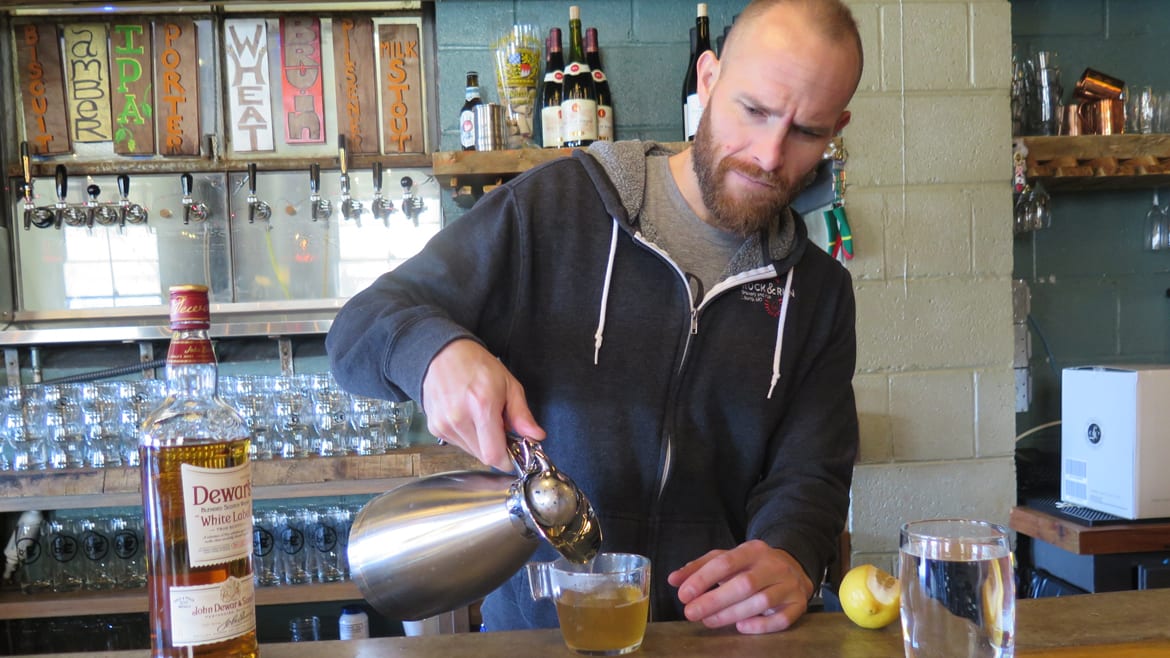Tap List | Brewery Emperial Serves Hot Worties
 Bartender Sam Shepard serves a hot worty with Dewar’s Scotch whiskey at Brewery Emperial. (Pete Dulin I Flatland)
Bartender Sam Shepard serves a hot worty with Dewar’s Scotch whiskey at Brewery Emperial. (Pete Dulin I Flatland)
Published December 12th, 2017 at 6:00 AM
Brewery Emperial (1829 Oak St.) now offers “hot worties,” fresh from the brewing kettle. A hot wort, similar to a hot toddy, is free while supplies last only on brewing days, starting at 4 p.m., with the purchase of a beer.
Brewers Keith Thompson and Sterling Holman make wort for a new batch of beer on brewing days. Wort refers to the sugary liquid extracted from the mashing stage of brewing beer. Cracked grain, most commonly malt, is mashed, mixed in hot water and steeped to create wort. Heating enables enzymes to convert starch in the grain to sugar. Later, yeast is added in another stage that will feed on the sugars and produce alcohol.
Brewery Emperial posts the brewing day schedule on the brewery’s Facebook page and on Instagram. It’s the only clue that hot worties are available. A small amount of freshmade wort is reserved and stored at the bar. To fill an order for a hot wort, a bartender fills a mug with the sugary liquid and adds a shot of Dewar’s Scotch whiskey (or the guest’s preferred whiskey) to the beer cocktail.
The flavor, color and aroma of hot wort varies, depending on the wort produced for a particular beer style. A pilsner hot wort produced the light aroma of yeast and biscuit and a light hazy golden liquor. A stout hot wort would exhibit roasted malt notes.

Hot wort will help warm your chilled bones. (Pete Dulin | Flatland)
Thompson and brewery co-owner Ted Habiger learned of the drink when they worked at 75th Street Brewery more than two decades ago. Brewery consultant Artie Tafoya introduced the drink to the 75th Street staff.

James Hightree (left) and John Randtke co-founded Wakarusa Brewing in Eudora, Kansas. (Courtesy of Wakarusa Brewing)
Wakarusa Brewing Debuts in Eudora, Kansas
John Randtke and James Hightree launched Wakarusa Brewing (710 Main St., Eudora, Kansas) recently in a former antique mall.
“We cleaned the building out to stone walls,” Randtke said. “[We added] new electrical, gas piping, water piping, sewer piping, drainage system, interior walls, roof, lighting, HVAC, exterior stucco, interior fireproofing and insulation.”
Federal law limits a homebrewer’s annual production to 100 gallons if there is only one adult residing in the household (and a maximum of 200 gallons if there are two adults). Since Randtke and Hightree sought to make greater volumes of beer and mead, they took steps to open a 2,400 square-foot brewery and taproom. The brewhouse consists of a three-barrel brew system with four three-barrel fermenters and three one-barrel fermenters.
Hightree handles primary brewing duties on a weekly basis.
“When we decided to open a brewery, James started to focus on refining his beer recipes. He’s been brewing longer than me and has brewed much more beer than I have,” Randtke said. “I focused on refining my mead recipes. There isn’t much good mead available on the market at a reasonable price, so I saw some potential in that.”
Regarding their approach to brewing, Randtke explained, “We’re trying to find the balance between consistency and experimentation.”
Past styles on tap included ginger-chamomile mead, Belgian wit, pale ale, and oatmeal stout. Wakarusa’s popular northeast-style IPA sells out regularly, so plans are afoot to brew more. Other potential creations include a vanilla-cinnamon mead and an imperial stout.
Wakarusa Brewing is open on Fridays from 5 to 11 p.m. and Saturdays from 4 to 11 p.m.

Saminator is unleashed this week from Rock and Run Brewery. (Contributed | Rock & Run Brewery and Pub)
Tap Notes
Let’s talk about sediment for a minute. Recently, Boulevard Brewing ambassador brewer Jeremy Danner wrote about “floaties,” or sediment, in beer. Sediment is not uncommon in different brands and styles of beer, but has become questioned more often lately with the rise in production and interest in hazy Northeastern-IPA styles.
“It’s perfectly normal for our bottled offerings to have some haze-causing sediment in the bottom of each bottle,” Danner wrote, regarding Boulevard’s beer. “The manner in which the beer is handled before and during pouring can certainly disturb this fine layer of sediment resulting in a beer that has a bit of a snow-globe effect.”
Boulevard Brewing also shared a recipe for Cranmerry, a tasty cocktail that uses its seasonal Cranberry Orange Radler, to help you ring in the holidays.
The current tap list at Brewery Emperial includes Biscuit, (5.2-percent ABV, 25 IBUs) which is part English ESB and old school American Pale Ale; Amber (5.3-percent ABV, 17 IBUs), made with hops from Royal Hops in Edgerton, Missouri; Baltic Porter (7.6-percent ABV, 34 IBUs); Wheat Ale (5.7-percent ABV, 9 IBUs); and other selections. Bruin (4.8-percent ABV, 9 IBUs), inspired by Belgian Flemish brown ales, was made with various kilned malts that balance sweetness and lactic souring in the kettle, “followed by secondary fermentation in our unique, square, open-topped fermentation tanks,” brewer and co-owner Keith Thompson said.
— Pete Dulin writes about food trends for Flatland and is the author of The KC Ale Trail. Follow @FlatlandKC and #TapList on Twitter for more food news and trends.




